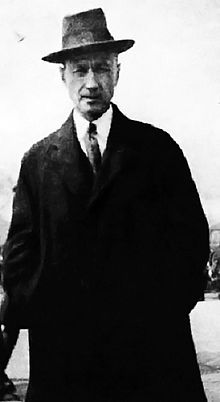Charles Ives
| Charles Ives | |
|---|---|
 |
|
| Background information | |
| Birth name | Charles Edward Ives |
| Born |
October 20, 1874 Danbury, Connecticut |
| Died | May 19, 1954 (aged 79) New York, New York |
| Occupation(s) | composer, insurance agent |
Charles Edward Ives (/aɪvz/; October 20, 1874 – May 19, 1954) was an American modernist composer. He is one of the first American composers of international renown, though his music was largely ignored during his life, and many of his works went unperformed for many years. Over time, he came to be regarded as an "American original". He combined the American popular and church-music traditions of his youth with European art music, and was among the first composers to engage in a systematic program of experimental music, with musical techniques including polytonality, polyrhythm, tone clusters, aleatory elements, and quarter tones, foreshadowing many musical innovations of the 20th century.
Sources of Ives' tonal imagery are hymn tunes and traditional songs, the town band at holiday parade, the fiddlers at Saturday night dances, patriotic songs, sentimental parlor ballads, and the melodies of Stephen Foster.
Ives was born in Danbury, Connecticut in 1874, the son of George Ives, a U.S. Army bandleader in the American Civil War, and his wife, Mary Parmelee. A strong influence of his may have been sitting in the Danbury town square, listening to George's marching band and other bands on other sides of the square simultaneously. George's unique music lessons were also a strong influence on him; George took an open-minded approach to musical theory, encouraging him to experiment in bitonal and polytonal harmonizations. It was from him that Ives also learned the music of Stephen Foster. He became a church organist at the age of 14 and wrote various hymns and songs for church services, including his Variations on "America", which he wrote for a Fourth of July concert in Brewster, New York. It is considered challenging even by modern concert organists, but he famously spoke of it as being "as much fun as playing baseball", a commentary on his own organ technique at that age.
...
Wikipedia
